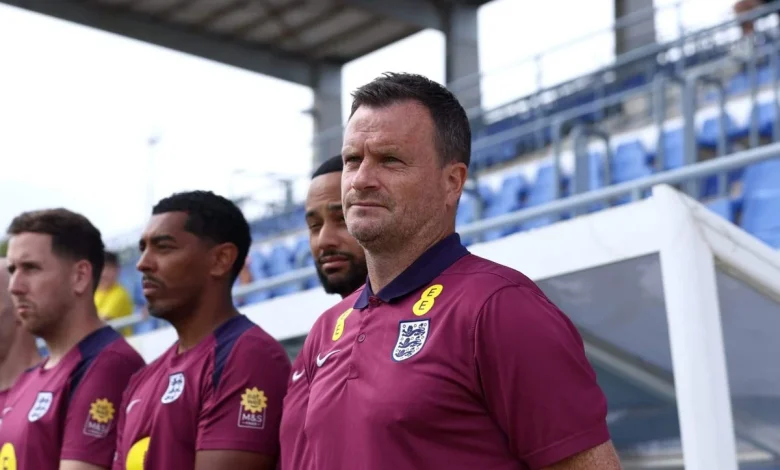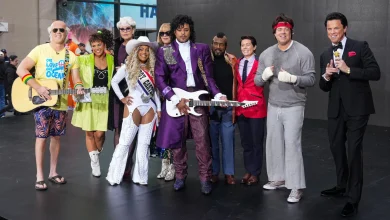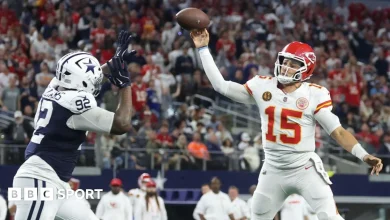Neil Ryan on managing England at the Under-17 World Cup: ‘It’s about DNA, continuity and playing our way’

Marc Guehi, Conor Gallagher, Callum Hudson-Odoi, Phil Foden and Morgan Gibbs-White are all in contention to be a part of Thomas Tuchel’s England side bidding to be crowned world champions next July in the United States. But all of them have already had a taste of what it feels like to hold that title.
They were all members of the England squad who won the Under-17s World Cup eight years ago this week. It was a talented team. Jadon Sancho, Emile Smith Rowe and Angel Gomes also featured, and have also gone on to wear the Three Lions at senior level.
Not all of the party who travelled to that tournament in India went on to have such glittering careers — Curtis Anderson, the goalkeeper who was the hero of a penalty shootout victory against Japan in the round of 16, has given up the pro game and now works as financial advisor helping guide young players on what to do with their money, and several others have forged only modest careers in the lower leagues — but that side’s collective achievement still serves as inspiration to the teenage generations following in their footsteps.
Another crop of England Under-17s are about to try to repeat that feat in the age group’s latest World Cup, which kicks off in Qatar on Monday.
Like the senior version of the tournament, which is expanding from 32 teams in its previous edition three years ago to 48 next June and July, the field is far bigger than the 24 sides who qualified for those 2017 finals. Former Manchester United youth coach Neil Ryan’s England will compete against 47 other nations to lift the trophy on November 27, and he believes this experience could be invaluable in the development of players who have yet to experience big-game environments and atmospheres.
“We’re going to give the players a challenge playing against the world’s best teams,” Ryan tells The Athletic. “The 2017 team was littered with talent. Of course, there are players who haven’t gone on to have such amazing careers, so you see the challenges they still face. There is certainly no guarantee this team will go on to play for the seniors in the future, but what you want to do is give them experience, put them under the pressure of a big tournament.
“The challenge is the tactics, the crowds, the pressure that comes with the games of tournament football — and of course, the World Cup. Hopefully, at the end of it, they will go back to their clubs and it will aid them as they progress along the pathway to senior football.”
Dan Ashworth, who was technical director at the time, introduced the concept of the ‘England DNA’ in 2014 — a coordinated youth development process based at the FA’s national teams headquarters at St George’s Park in the Midlands.
For a decade, coaches have been nurturing future generations of young players, who have already received advanced coaching at Category 1 club academies around the country, with the view that everything about playing for England at the various age groups is the same: the training-camp environment, the training sessions, the approach to and preparation for games. It means that if they are eventually good enough to step up to senior level, the only thing that will be a shock to them will be the bigger stage. Everything else will feel familiar.
It has brought results. In 2014, the under-17s won that age group’s European Championship. As well as that Under-17 World Cup in 2017, the under-20s also won their version and the under-19s were crowned European champions. There was another Under-19 Euros triumph in 2022, and England Under-21s celebrated back-to-back European titles in 2023 and again this summer.
Since 2014, the full England side have also got to two European Championship finals and a World Cup semi-final but are yet to lift silverware.
The aim of the under-17s, and all the age groups, is ultimately to see youth success replicated at senior level as well as maintained at events such as the one about to begin in Qatar.
“If our boys can do well at these tournaments, get that experience, that is something that you would hope eventually they can take with them to the seniors, and to the big tournaments,” Ryan says. “That’s been the whole purpose of the pathway: to feed players to the senior team and give them great experiences, so it’s not their first experience when they arrive at the World Cup next summer.
“John McDermott (the FA’s technical director) oversees the whole structure from under-15s upwards, and it is about the England DNA, about continuity and playing the England way.”
England had to come through a tough qualifying campaign to reach this World Cup, and there is never a guarantee that they will be part of every age-group tournament going forward. A case in point: although 48 teams are competing in these finals, two traditional European footballing powers in Spain and the Netherlands will not be among them.
They will also be facing some unknowns: there will be the heat of Qatar to acclimatise to, even though, as with the 2022 senior World Cup, it is being staged in the northern hemisphere’s winter when temperatures in the Gulf state are lower than in summer and they held a warm-weather training camp in Cadiz, southern Spain, in September.
England’s senior side made the quarter-finals of the 2022 World Cup, also staged in Qatar (Julian Finney/Getty Images)
England are in Group E, and will face Venezuela in their opening game on Tuesday, November 4, Haiti three days later and Egypt next Monday, November 10. If they are successful, it could mean playing a total of eight games in 23 days with a 21-strong squad, fewer than managers get for a senior World Cup, that includes three goalkeepers.
“Our boys have not played these opponents in the group stages before, and they’ll all bring such different challenges for us — the cultures, the different styles of play,” Ryan says. “Each game brings its pressure to both nations, and the world is watching.
“It’s a fantastic opportunity for these boys to be testing themselves a little bit of the unknown. We will be prepared, but there is still that unknown element to it, and we want to do ourselves justice by knowing how well these boys can perform, make sure they perform and go out there and give themselves the best chance.
“It’s a great challenge, but it is what we want. The pressure of getting to these tournaments and competing will hopefully benefit the senior team in the future.”
The England squad for the 2025 Under-17 World Cup
Goalkeepers Lanre Awesu (West Ham United), Dylan Moody (Southampton), Jack Porter (Arsenal).
Defenders Kaden Braithwaite (Manchester City), Jun’ai Byfield (Tottenham Hotspur), Dante Headley (Manchester City), Bendito Mantato (Manchester United), Freddie Simmonds (Brighton & Hove Albion).
Midfielders Bradley Burrowes (Aston Villa), Landon Emenalo (Chelsea), Reigan Heskey, Ryan McAidoo, Harrison Miles (all Manchester City), Louis Page (Leicester City), Seth Ridgeon (Fulham), Tynan Thompson (Tottenham Hotspur), Reggie Walsh (Chelsea), Luca Williams-Barnett (Tottenham Hotspur).
Strikers Chizaram Ezenwata (Chelsea), Alejandro Rodriguez (Olympique Lyonnais), Igor Tyjon (Blackburn Rovers).
You can watch all three of England’s group-stage matches, as well as select fixtures from the knockout stages, free-to-air across ITV4 and ITVX





